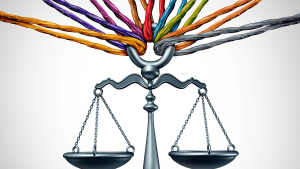- John Belden
- Reading Time: 3 minutes

At first glance, the Teradata lawsuit against SAP might just appear to be simply a dispute between two software companies regarding intellectual property. However, this is far from true. This lawsuit could have a profound impact on SAP’s current customer base as they look to negotiate with SAP in the procurement of the S/4HANA platform.
Summary of Lawsuit
On June 21st, 2018, Teradata filed a surprise lawsuit against SAP claiming that SAP inappropriately used trade secrets and is using unlawful means to monopolize the data warehouse market. Teradata is seeking to halt SAP from using these trade secrets in its products and is seeking damages for lost profits.
Many of these lawsuits result in settlements prior to trial that do not involve the exchange of money associated with damages, but rather a change in practices of one company. With that in mind UpperEdge has identified three specific areas where SAP’s current clients may benefit if they understand what is at stake and how it can be used as leverage in future negotiations with SAP.
Here is our take:
Product Price Leverage I
Teradata has claimed that SAP has illegally bundled its ERP product with its EDW (Enterprise Data Warehouse). The company is claiming that SAP is not leaving customers any choice in having to purchase both capabilities when only one of those capabilities is needed by the client. Clients can benefit from this by utilizing the same approach Teradata is using to stipulate that SAP’s product is overpriced if the client does not intend to leverage the EDW product. The end result of this lawsuit may mean SAP will have to redefine the S/4HANA product as having both components priced individually — but don’t look for that to happen for a few years. In the short term, the forced bundling is a leverage point for clients.
Product Price Leverage 2
Teradata has claimed that SAP customers do not have switching options due to the cost of switching and that SAP has provided only a short period of time that clients must make the move to S/4HANA. SAP has challenged Teradata’s claims on both points. Customers can benefit on two fronts as this suit progresses. First, SAP will be forced to clearly lay out for a judge how customers can economically make a switch to another ERP product. Customers can leverage SAP’s own arguments regarding switching options with SAP to potentially generate additional leverage on price. Second, one of the potential settlement options is for SAP to extend the expected time of maintenance for its product allowing clients a longer period to negotiate with SAP and generate leverage based on not having to buy software on a schedule.
Indirect Access Exposure
Teradata makes the case that SAP’s Indirect Access policies and SAP’s technical configuration are inhibiting vendors such as Teradata from easily accessing SAP’s data structures. This Teradata describes as anticompetitive acts that are causing material damage to the company. This is the first lawsuit that we are aware of brought by a vendor that challenges SAP Indirect license practices. Other vendors may have considered it, but likely value the relationship with SAP too much to want to disrupt it with a lawsuit. This one could go either way for existing clients. If the court finds there are merits associated with Teradata’s claim, customers will end up with a reduced exposure profile. However, if the court dismisses Teradata’s claim on these points, SAP may feel more emboldened to pursue Indirect Access claims.
Current Status of the Case and Recommendations
Teradata has responded to SAP’s motion to dismiss and SAP is scheduled to provide a rebuttal in mid-October. Following this, the judge is scheduled to rule on SAP’s motion in the first week of November. In the meantime, UpperEdge recommends that any company considering starting negotiations with SAP regarding S/4HANA contact us immediately to understand how we can put your organization in the best position to get the right deal with SAP.
Comment below, follow me on Twitter @jmbelden98 find my other UpperEdge blogs and follow UpperEdge on Twitter and LinkedIn.
Related Posts
Related Blogs
SAP Cloud ERP Packaging: Price Hikes Without Transparency
Deloitte’s Defense Unfolds: The Contract That Could Decide the Zimmer Biomet Case
Inside SAP’s Q3 2025: Strong Cloud Growth, AI Push, and Pricing Power Plays
About the Author
